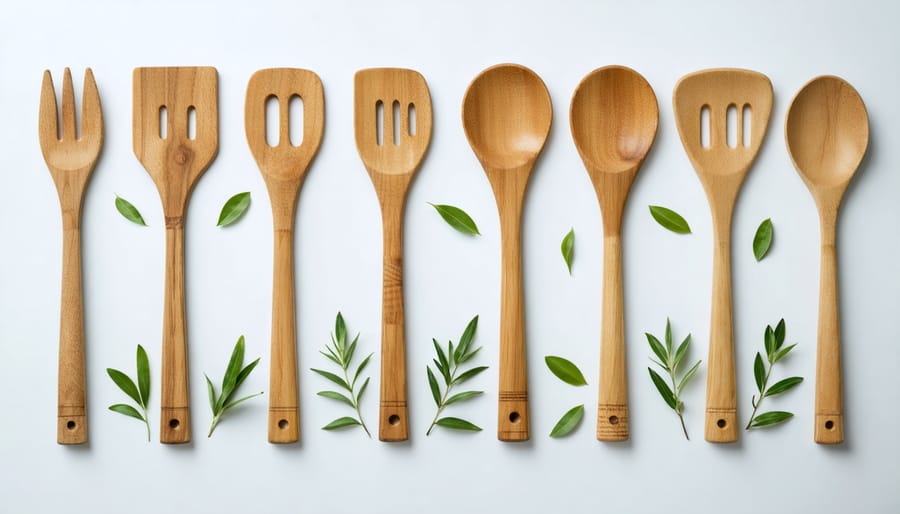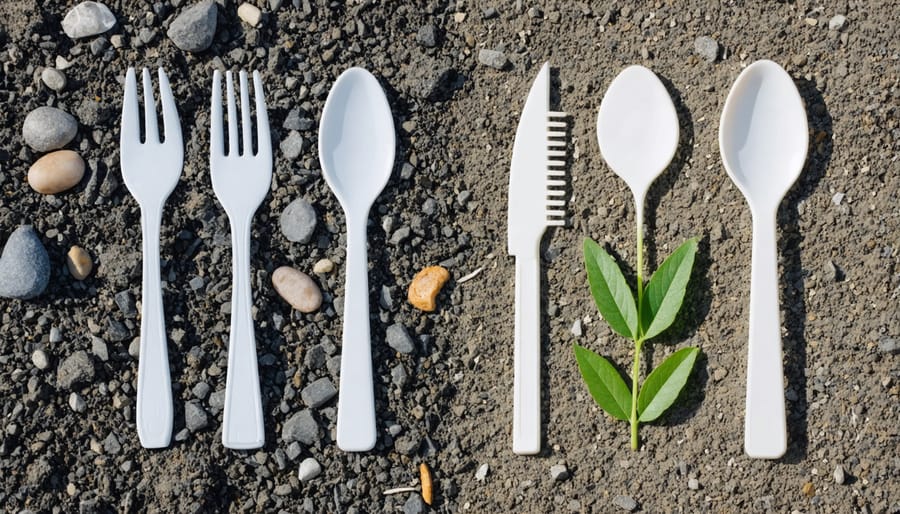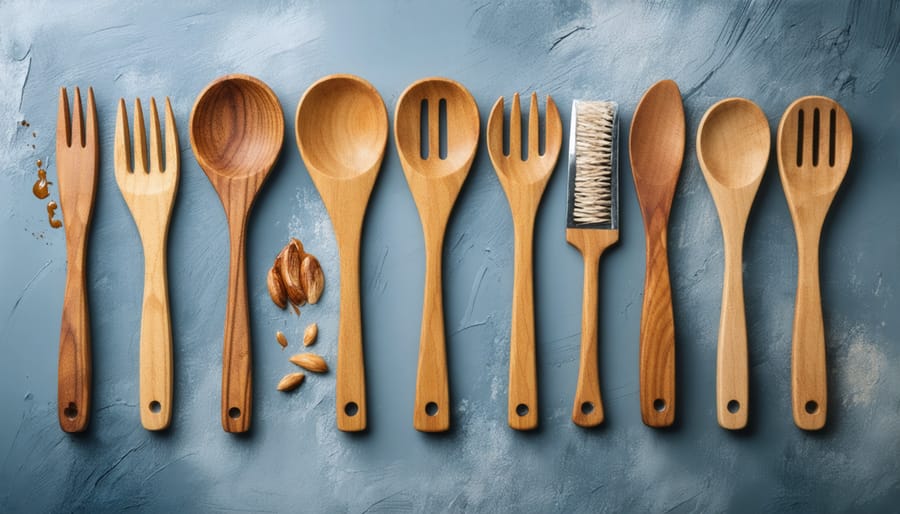
Transform your kitchen into an eco-conscious haven by switching to sustainable cooking utensils that not only protect our planet but elevate your culinary experience. From bamboo spatulas that glide effortlessly across your pans to durable wooden spoons that develop rich patinas with each use, eco-friendly kitchen tools offer a perfect blend of functionality and environmental responsibility. Gone are the days when sustainable meant sacrificing quality – today’s earth-friendly utensils combine innovative materials like reclaimed wood, organic bamboo, and biodegradable composites with thoughtful design that stands up to daily use.
As a home chef who’s tested countless kitchen tools, I’ve discovered that eco-friendly utensils often outlast their plastic counterparts while adding a touch of natural beauty to your cooking space. Whether you’re stirring a bubbling pot of soup or flipping delicate pancakes, these sustainable alternatives provide the perfect opportunity to reduce your environmental footprint without compromising on performance. Let’s explore how making this simple switch can revolutionize your cooking experience while helping protect our planet for future generations.
Why Your Kitchen Utensils Matter More Than You Think
The Hidden Environmental Cost of Kitchen Tools
While we all love our kitchen tools, many conventional utensils come with hidden environmental costs that might surprise you. Those cheap plastic spatulas and spoons often contain harmful chemicals, break easily, and end up in landfills where they can take hundreds of years to decompose. Even metal utensils can have a significant carbon footprint due to mining and manufacturing processes.
The non-stick coatings on many modern kitchen tools pose another concern, as they often contain PFAs and other chemicals that can harm both our health and the environment. Mass-produced wooden utensils might contribute to deforestation when not sourced responsibly, while bamboo alternatives sometimes use harmful adhesives in their manufacturing.
As more home cooks embrace zero-waste kitchen habits, it’s important to understand these hidden costs. The good news? There are plenty of eco-conscious alternatives that can make your cooking both sustainable and enjoyable.

Better for Earth, Better for Your Cooking
Making the switch to eco-friendly cooking utensils isn’t just a win for the environment – it’s a game-changer for your culinary adventures too! Natural materials like bamboo and sustainably harvested wood bring a warm, authentic feel to your kitchen while offering superior cooking performance. Unlike plastic utensils that can leach chemicals into your food, these sustainable alternatives are naturally non-toxic and safe for your family.
I’ve noticed that my wooden spoons and bamboo spatulas actually get better with age, developing a beautiful patina that tells the story of countless meals shared. These materials are also gentler on your cookware, preventing scratches on your favorite pots and pans. Plus, they’re naturally antibacterial and won’t retain strong odors or flavors from previous dishes.
From my experience hosting cooking gatherings, guests always comment on how these sustainable tools make cooking feel more connected to nature and mindful. It’s amazing how something as simple as switching to eco-friendly utensils can enhance both our cooking experience and our planet’s health.

Must-Have Sustainable Kitchen Tools
Bamboo Beauties
When I first discovered bamboo utensils, they completely transformed my journey to healthy cooking success. These beautiful, natural tools aren’t just aesthetically pleasing – they’re incredibly practical and planet-friendly too. Bamboo’s natural antimicrobial properties make these utensils naturally resistant to bacteria, while their gentle texture won’t scratch your precious cookware.
What I love most about bamboo utensils is their incredible durability combined with lightweight handling. They’re strong enough to stir thick batters yet gentle enough for delicate non-stick surfaces. Plus, bamboo doesn’t conduct heat the way metal does, so you won’t burn your hands while cooking.
From an environmental perspective, bamboo is a superstar. It grows incredibly fast – up to three feet in just 24 hours! – and requires no pesticides or artificial irrigation. When your bamboo spatula or spoon eventually reaches the end of its life, it will biodegrade naturally, leaving no trace behind.
These versatile tools are perfect for everything from stir-frying vegetables to folding cake batter, making them an essential addition to any eco-conscious kitchen.
Reclaimed Wood Wonders
There’s something magical about cooking with utensils crafted from reclaimed wood. I discovered this charm when I inherited my grandmother’s old wooden spoon, and it inspired me to explore more sustainable kitchen tools. Reclaimed wood utensils aren’t just eco-friendly; they each tell a unique story through their distinctive grain patterns and natural character.
These sustainable treasures often come from sources like old barns, retired wine barrels, and salvaged furniture. By choosing reclaimed wood utensils, you’re not only preventing new trees from being cut down but also giving new life to materials that might otherwise end up in landfills.
Many artisans now specialize in transforming these rescued woods into beautiful spatulas, serving spoons, and cutting boards. The dense, aged wood is naturally more durable than newly harvested timber, and years of natural seasoning make these tools particularly resistant to warping and splitting.
When shopping for reclaimed wood utensils, look for pieces certified by the Forest Stewardship Council (FSC) or similar organizations that verify the wood’s sustainable source. Remember, each scratch and mark adds to their charm, making your cooking experience even more special.
Stainless Steel Stars
When I made the switch to stainless steel utensils in my kitchen, I couldn’t believe I hadn’t done it sooner. These gleaming kitchen workhorses are the epitome of sustainable cooking tools, offering incredible durability that can span generations. Unlike plastic alternatives that need frequent replacing, a well-maintained set of stainless steel utensils can last decades, making them a fantastic eco-conscious choice.
I particularly love how versatile these tools are – from sturdy spatulas that flip pancakes perfectly to slotted spoons that drain pasta with ease. They’re naturally resistant to rust, won’t leach harmful chemicals into your food, and can handle high temperatures without warping. Plus, they’re completely recyclable when (and if) they ever reach the end of their very long life.
One of my favorite features is their low-maintenance nature. A simple wash with warm, soapy water is all they need, and they’re dishwasher safe too. For those concerned about style, stainless steel utensils add a professional, timeless look to any kitchen while being kind to our planet. Just remember to look for options with bamboo or stainless steel handles to maintain that fully sustainable approach.
Natural Fiber Heroes
When it comes to keeping our eco-friendly kitchen tools spotless, natural fiber heroes are your best allies. I absolutely love my coconut fiber dish brush – it’s become my go-to for tackling everything from crusty pans to delicate glasses. These sustainable cleaners are made from renewable materials like bamboo, sisal, and hemp, offering the perfect balance of scrubbing power and gentleness.
A personal favorite in my kitchen is the loofah sponge, which comes from dried gourd fibers. It’s amazing how something so natural can be so effective at cleaning! Plus, these plant-based scrubbers are completely biodegradable, returning to the earth when they’ve served their purpose.
For those stubborn pots and pans, hemp scrubbers work wonders without scratching your cookware. I’ve found that natural fiber cleaning tools actually last longer than their synthetic counterparts when properly cared for – just make sure to rinse them well and allow them to dry completely between uses.
The best part? These natural alternatives are free from microplastics and harmful chemicals, making them safe for both your family and our oceans.
Caring for Your Eco-Friendly Kitchen Tools
Cleaning and Storage Tips
Caring for your eco-friendly utensils properly not only extends their lifespan but also maintains their sustainable qualities. As part of your mindful kitchen techniques, start by washing your utensils with gentle, natural dish soap and warm water immediately after use. For wooden items, avoid soaking them and dry them thoroughly with a clean cloth to prevent warping or cracking.
When cleaning bamboo or wooden utensils, occasionally treat them with food-grade mineral oil or coconut oil to maintain their natural moisture and prevent splitting. For stainless steel tools, a mixture of baking soda and water can help remove any stubborn stains without harsh chemicals.
Store your utensils in an upright container or drawer organizer made from sustainable materials like bamboo or recycled wood. Keep wooden and bamboo items away from direct sunlight and excessive heat or moisture. Consider using cloth separators between tools to prevent scratches and maintain their appearance. By following these simple care instructions, your eco-friendly utensils will serve you well for years to come, reducing the need for replacements and supporting your sustainable kitchen goals.

When to Replace and How to Dispose
Even the most sustainable kitchen tools eventually need replacing, and knowing when and how to do this responsibly is key to maintaining an eco-friendly kitchen. Look for signs of wear such as deep scratches in wooden utensils, fraying bamboo, or warped silicone edges – these can harbor bacteria and affect your cooking experience.
For wooden utensils, consider replacing them when they develop deep cracks or show signs of splintering. Bamboo items typically last 2-3 years with proper care, while high-quality silicone tools can serve you well for 3-5 years if maintained correctly.
When it’s time to say goodbye to your old utensils, remember that many materials can be repurposed. Wooden and bamboo tools can be composted or used as garden markers. Stainless steel items are widely recyclable – just check with your local recycling center for specific guidelines. For silicone utensils, look for specialized recycling programs or consider upcycling them for non-food uses, like craft projects or garage organization.
Before disposing of any items, see if they can be donated to community kitchens or art programs if they’re still in usable condition.
Making the switch to eco-friendly cooking utensils isn’t just a trend – it’s a meaningful step toward a more sustainable kitchen and planet. As we’ve explored throughout this article, there are countless options available that combine functionality, style, and environmental consciousness. From bamboo spatulas to stainless steel measuring spoons, each sustainable choice we make in our kitchen contributes to reducing plastic waste and our overall environmental impact.
Remember, transitioning to an eco-friendly kitchen doesn’t have to happen overnight. Start small by replacing items as they wear out, focusing first on the utensils you use most frequently. Consider investing in quality pieces that will last for years, and don’t forget to properly care for your sustainable utensils to extend their lifespan.
I’ve personally found that making these changes has not only helped me feel better about my environmental impact but has also enhanced my cooking experience. There’s something special about preparing meals with beautiful, natural materials that connect us to both tradition and sustainability.
As our community of conscious cooks grows, we’re proving that small changes in our kitchen habits can lead to significant positive impacts on our environment. Whether you’re just starting your eco-friendly kitchen journey or looking to expand your sustainable utensil collection, remember that every mindful choice counts. Let’s continue to share our experiences, discoveries, and tips as we work together toward more sustainable kitchen practices.



